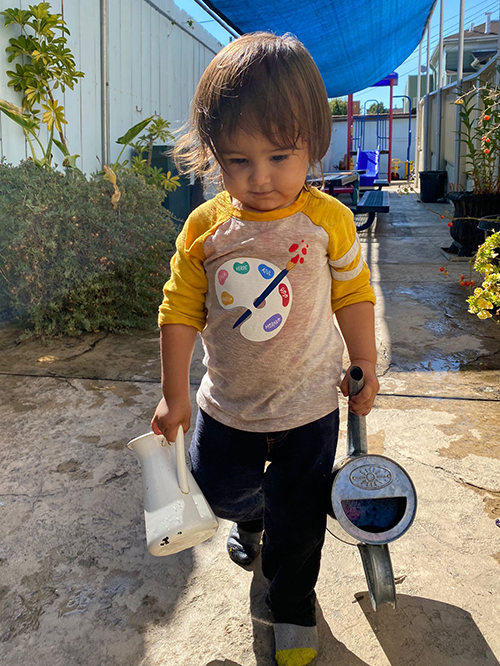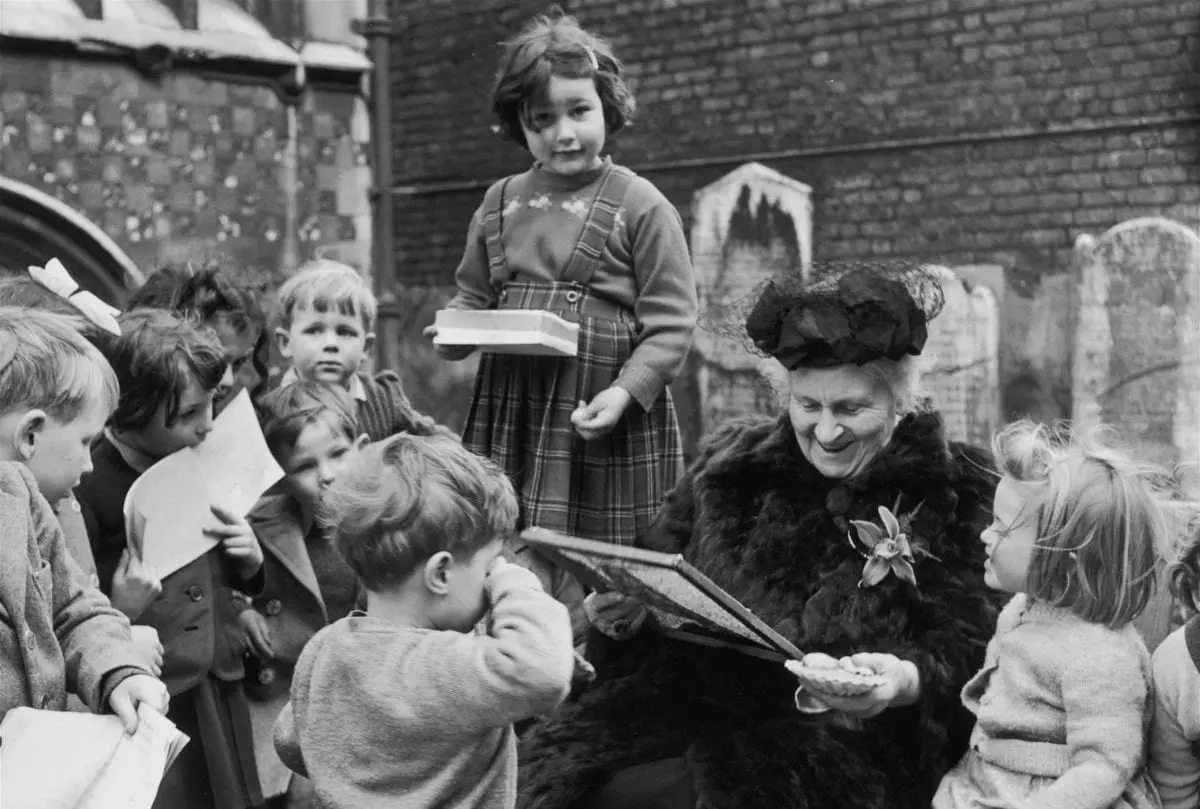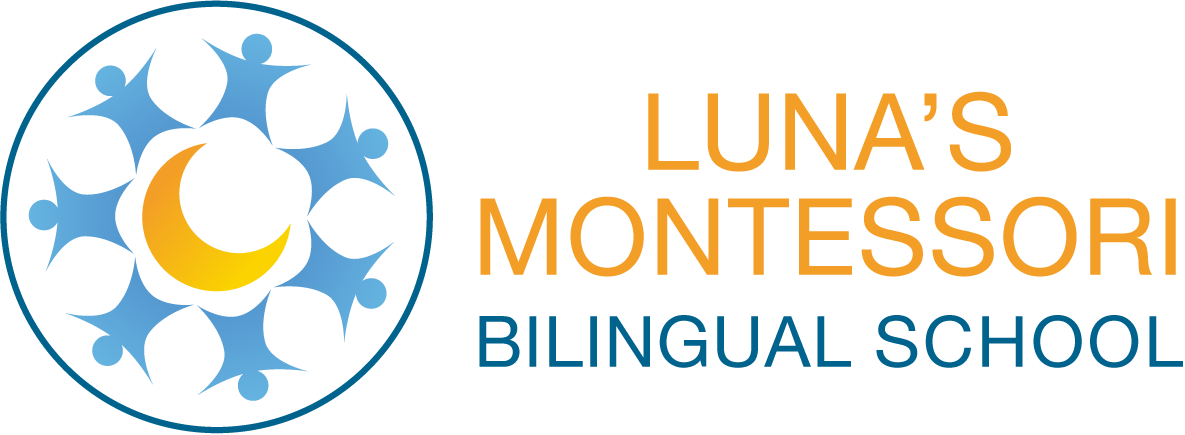CURRICULUM
Our credencials
Luna’s Montessori Bilingual School is a family-oriented school with two classrooms that have plenty of natural light and a beautiful playground. We offer the young child a program with a wide variety of learning experiences utilizing the Montessori approach to education. The progress of each child is documented in the records of the school and the director/Teacher will discuss this process with the child’s parents during the parent/teacher conferences. Children will be supervised at all times by a staff member. The program operates five days a week, Monday through Friday, from 7:00 am to 6:00 pm.
The primary goal of Montessori is to help each child reach his/her full potential in all areas of life. Activities promote the development of social skills, emotional growth, and physical coordination as well as cognitive preparation for future intellectual academic endeavors.
The classroom offers space for movement, space for individual work, and space for group activities. Children are given opportunities to work in the development of language skill, art, music sensorial, and practical life. We use a number of multi-sensory, sequential, and self-correcting Montessori materials to facilitate learning.
The first task a child learns when he or she comes to the Montessori classroom is that there is order in the classroom. The children learn that materials belong on the shelf at a specific place and after using it they have to replace it back at the same place. The teacher demonstrates this first. When a child selects a task, he/she repeats the activity until he/she masters the task.
The core of the Montessori curriculum is practical life, sensorial, language and mathematics activities. In addition to the core curriculum, there are enrichment activities, which include science, geography, art and special classes.

Practical Life
“Any child who is self-sufficient, who can tie his shoes, dress or undress him/herself, reflects in his/her joy and sense of achievement the image of human dignity, which is derived from a sense of independence”
— Maria Montessori
The practical life area provides that children with practical life activities, which gives the child a feeling of dignity, accomplishment, and self- confidence. The exercises of practical life are fundamental for the child’s development because it supports the tendencies and needs of the young children. The practical life area is particularly emphasized as the activities in this area give children the chance to develop skills to care for themselves and their environment in the following areas: Control of movement, care of self, care of the environment, grace and courtesy. Practical life also develops muscular coordination, order, concentration and physical independence and assist in the control of refinement of both gross and fine motor skills.
Sensorial
Sensorial Development is one of Maria Montessori’s greatest gifts to early education. Her scientifically designed materials help the child to form clear concepts and thereby help build the foundation for intellectual development. Sensorial refinement developed during these years is permanent.
“The aim of Sensorial Exercises is an inner one, namely, that the child train himself to observe; that he be led to make comparisons between objects, to form judgments, to reason and to decide; and it is in the indefinite repetition of this exercise of attention and of intelligence that a real development ensues.”
— Maria Montessori
The sensorial area allows children to use their senses to learn about the world. These materials isolate a defining quality, such as color, size, sound, texture or shape. They help to develop the child’s visual, auditory and tactile senses. Some Montessori materials, such as geometric solids are concrete representations of mathematical concepts that appear in later schooling.
Language
The Development of language begins with the presentations and classification of the vocabulary of the child’s own surroundings. Phonics are used to teach the basic language skills.
“Knowledge can best be given where there is eagerness to learn, so this is the period when the seed of everything can be sewn. The child’s mind being like a fertile field, ready to receive what will germinate into knowledge.”
— Maria Montessori
Language activities and materials increase vocabulary and conversational skills, develop writing, and reading skills and begin and understanding of grammar. The language materials include objects and pictures to be named, matched, labeled and classified to aid vocabulary development. Textured
letters allow the child to feel and see the alphabet. Phonics and the moveable alphabet lead the child toward reading.
Mathematics
The math area provides the child with ideas for their intellectual development. Hands on experience with math materials give children clear, concrete impression on which to build their own abstractions. This is a concrete experience in the Montessori classroom. Special materials such as spindle boxes and bead bars allow the child to see what “nothing” or zero looks like, or to see that multiplying 5×5 can be done with 5 bars of 5 beads each. We have children in different levels using a variety of our math materials such as:
- Number Rods: an important building block of math is hierarchy. Your child learns to put rods in order using his or her sense of touch and sight
- Sandpaper Numerals: introduces symbols and the vocabulary for the numerals
- Spindle Boxes: used to reinforce the child’s understanding of number names, numerals and quantities
- Introduction to the Decimal System: used to introduce the child to name and the relative sizes in the hierarchy of numbers
Cultural Curriculum
Children learn how to make the world a more peaceful place. The cultural curriculum allows our children to explore the world. They are introduced to life cycles of animals and plants, cosmic education, holidays, birthday celebrations, countries, continents, and diverse cultures.
Snack
Programs
Staff
Calendar
Family Handbook
TESTIMONIALS
WHAT SOME OF OUR PARENTS THINK ABOUT US
“Fortunately, we had choices when it came to preschool for our son and we decided to send our son to Luna’s. He has attended the school for the last two years and we plan to have him stay until Kindergarten.
From the moment we attended the school’s open house, we felt an immediate connection with the staff and the school. We loved the curriculum and the program philosophy of having a blended Montessori curriculum with a traditional learning structure.
I appreciate the consistent environment of the school: the school is always bright, cheerful and safe. Over time, the teachers have become our friends and our son has excelled in his academics (bilingual, phonics, writing and arithmetic), his social skills, and his creative/organized mind.
We have been impressed with the parent’s network and social outings (like the zoo, symphony and fire station) and applaud the hard work of the staff. Our daughter will be attending the school next Fall.”
415.427.4278 | heather_gille@gap.com
“We joined the LMBS family in summer of 2008. The transition to LMBS was very smooth because of their two adjustment days that allowed our daughter Alyssa to ease into school prior to starting the program. Within a few days Alyssa was singing her Spanish songs and saying that she likes her teachers Ms. Ava & Ms. Lauda. Abby is very accommodating and responsive to our requests and questions. Aside from the great staff, the facility is clean and bright. LMBS also have a Yahoo group that keeps all the parents connected and informed.”
“My son has spent a year and a half at Luna’s Montessori, and he has thrived mentally, emotionally, and physically beyond our expectations. He will definitely be well prepared for Kindergarten. The school offers an age appropriate challenging environment, and the teachers are especially nurturing and understanding of pre-k feelings and needs. And we think it’s pretty awesome that we have a Spanish speaker in the house!”
“I am a mother of a 4 year old preschooler at Luna’s Montessori School. We have 3 children and it was time to send our oldest child to school…a scary and daunting task.
I must say we chose very wisely. We found a wonderful school with the most caring, welcoming, and patient teachers. I feel that they truly care about our daughter and want to see her grow and succeed.
I thought that I would be labeled the Crazy Mom when my daughter started school. I am very involved and I ask a lot of questions. Our daughter is our world and our most precious gift. Abigail understands this and encourages it! She is flexible and understanding that with 3 kids there are certain things we can’t help with but we can make it up in other ways.
My daughter loves school and talks about Ms. Abby and Ms. Laura all the time! With their help she is growing more and more everyday. We look forward to all of our children attending Luna’s Montessori School! We are very happy with our decision!!”
510-205-6945, December-2010
“Prior to attending LMBS, our now 4-year old daughter had never attended any day care nor pre-school. She was 3 years and 1 month and was still not potty trained at all. She was shy around strangers and though she learns things quickly, she’s also very stubborn about changing her ways, which unfortunately included not wanting to potty in the toilet.
Our son was just born and she was getting very edgy around the house. We had put ourselves on a wait list for a school on the west end, but we had not heard from them for over 18 months (talk about planning ahead and yet still fall short on schools). So we started looking for schools for her. We visited a number of schools, many are highly regarded on the island and we took her to a few, but none of the schools felt really good to us, some were too military, some were too crowded (we visited one which smelled like poop), and some were simply not as good as they were made out to be.
Then I started to think why not LMBS, which is just around our house and looked decent from the outside. The moment I walked in I felt really good about the school, from the teaching philosophy to the teachers to the campus (which is a large bright sunny Victorian house with a big backyard). The teachers / students ratio was great (meaning not too big but not too small, just right for us), and they had many tuition / schedule options which was great since we did not need her to be in any school full time.
We took her to the school and she felt very comfortable which we did not see when we visited other schools, including some of the well known Montessori schools in Alameda. Because it was her first ever preschool and she’s never been to day care before, and her English was OK but not as good as her Chinese (English is her native language but she was primarily cared by her grandmother who’s Chinese and speaks Mandarin to her at home), we did not want to overwhelm her. We signed her up for two full days a week (9 AM to 6 PM), and thought it would be a good introduction to her, but she loved it so much that on her request, we switched her to full time (school starts at 7:30 AM to 6 PM, but we take her in before 9 AM and pick her up around 5:30 PM), right away from the very first week. It’s been 1 year and 2 months at the time of this review, and we are very pleased with her progress. Within a very short period of time, she had potty trained herself, and she speaks better English than we do (so it feels), and she is also learning good amount of Spanish. The school is sparkling clean, the teachers are great and encourage strong, independent thinking while providing ample guidance and discipline, and there are a lot of different subjects they teach.
We’ve always known our daughter to be very advanced (emotionally and academically) for her age, and LMBS really brings out the best in her. Getting her started took a while for us, but mainly because we were following the “word of mouth” method and did not investigate on our own. LMBS is a relatively new school and does not have a lot of Berkeley Parents network postings but it’s a fantastic school with great women teachers. Our son is now 15 months old, and his favorite daily activity is to go to LMBS with his grandparents to drop our daughter off and then again pick her up. He can linger for hours there. It is a no-brainer for us to decide where to send him to school when he’s old enough. ”
MONTESSORI
About the method
The Montessori Method is the product of an educational philosophy developed by Dr. Maria Montessori (1870-1952) in the early years of this century. Dr. Montessori was Italy’s first woman doctor, but she is far better known as an educator and an innovator in the field of early childhood education.
The work of Dr. Montessori and the formulation of her method constitutes an interesting story. As a young medical school graduate, Dr. Montessori was appointed head of an institution for mentally deficient children, what would now be called “developmentally disadvantaged” children. The work of Dr. Montessori and the formulation of her method constitutes an interesting story. As a young medical school graduate, Dr. Montessori was appointed head of an institution for mentally deficient children, what would now be called “developmentally disadvantaged” children. The care these children received was limited to feeding and keeping them reasonably clean in a sterile and unstimulating environment. Dr. Montessori felt that the minds of these children could be reached by effecting teaching methods. She astounded the Roman medical establishment by showing that these “retarded” children could outscore normal school children I tests.

Her next step was to apply these same principles to normal children. Her method and fame soon spread beyond Italy to the rest of Europe, the United States, and as far as India. Maria Montessori devoted her life to the research and observation of children and established numerous centers around the world where her method has been put into practice.
The Montessori Method is aimed at the development of a child’s full potential, both physical and mental. Dr. Montessori believed that the initial years (birth to six years) are the crucial once for the child’s development and that the smallest infancy’s mind is active and must receive the proper stimuli. Her philosophy of education is based on her respect for the children and his needs. She believed that the
pre-school years (ages five and under), when a child is developing his concept of himself, are fundamental to his future fulfillment.
“Before anyone can assume… responsibility, he must be convinced that he is master of his own actions and have confidence in himself.” She saw that unsatisfied needs of the children inevitably leave their mark in the adult. She believed that the “establishment of a new and better relationship between children and adults” would solve a fundamental problem in education.
The Montessori Method is an approach to education which emphasizes the potential by means of prepared environment, utilizing specially trained teachers and uniquely designed learning materials and apparatus having inherent appeal to the pre-school age child. The goal of a Montessori education is to foster independence, self-direction, responsibility, self discipline, self acceptance and love of learning in the development of the child.
“The habits and skills which the child obtains at school are good for a lifetime. They will help them work more efficiently, to observe more carefully, and to concentrate more effectively through their life.”
– Maria Montessori

